Last updated: March 21, 2023
Article
50 years as a National Park Service concessioner; a lifetime commitment to the Riverways
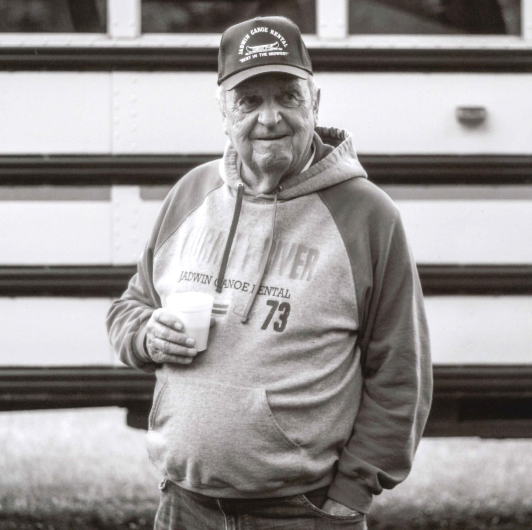
NPS Photo
VAN BUREN, Mo: Ozark National Scenic Riverways is a special place. Indeed, it boasts the first two protected rivers in our nation and some of the most spectacular natural and cultural resources found anywhere. But some of the most precious resources are the people who have chosen to spend their lives here. There are countless stories flowing through the hills and hollers that make up the Ozarks. Some are true, some are partly true, and some don’t let the truth get in the way of a good story. Many of these stories and the people that make them up are intertwined with the Riverways, such that the two can’t be separated. One such story is that of Darrel Blackwell.
It’s not often that someone or something can be considered “one of a kind.” However, in the case of Darrel Blackwell, you have just that. This past January marked 50 years since Darrel purchased Jadwin Canoe Rental and became a concessioner for the National Park Service (NPS). While that is a great accomplishment in and of itself, it does not paint the full picture of the relationship between Darrel Blackwell and Ozark National Scenic Riverways. Darrel worked four summers as a park ranger for the NPS in the early days of the park’s establishment. In addition, a portion of his family’s farm was acquired through eminent domain during the creation of the park. To our knowledge, Darrel Blackwell is the only person along the Riverways to have these three distinct experiences. It’s possible that no one in the history of the NPS shares these three same experiences either. Recently, Riverways Chief of Maintenance William Terry, who grew up in Jadwin, sat down to catch up with Darrel about reaching his 50-year milestone as a park concessioner. William has used many of Darrel’s own words to share his unique and true story with you.
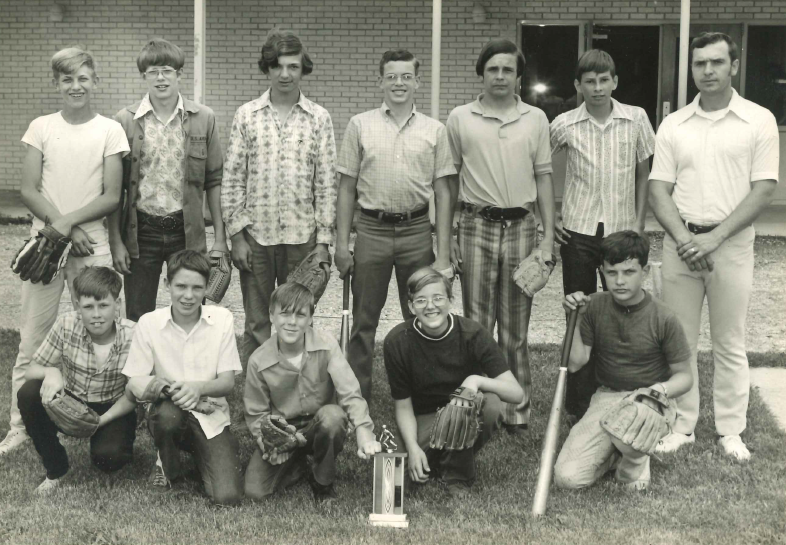
Photo courtesy of Darrel Blackwell
Darrel Blackwell grew up in the community of Rector, Missouri, in northern Shannon County with his father Wayne, mother Iceline, and brother Charlie. Wayne was a hard-working farmer, and Iceline was a teacher at the local schoolhouse. Wayne managed two farms, one in Rector where the family lived and the other along Current River across from present day Pulltite. Wayne Blackwell bought their farm across from Pulltite in the mid-1930s. In 1937, Wayne and Roy Weise built a new road down into Pulltite for access to the property. Today, Highway EE predominantly follows the route of that very first road down to the river.
“Dad bought a TD21 bulldozer that started on gas then switched over to diesel,” explained Darrel. “He had a big pull grader and a lot of dynamite to clear stumps out and get the road pushed out.”
After the road was completed, there were still difficulties getting across the river at Pulltite. Sometime in the early 1940s, Wayne built a ferry boat to help cross the river at Pulltite. If you know where to look, you can still see remnants of the ferry boat there today.
The Blackwell farming operation mainly consisted of cattle. For a time, the family grew crops in some of the bottom fields along the river.
Darrel recalled, “When the Johnson grass got too bad that we couldn’t fight it any longer, dad decided to plant oats in the fields. We then cut the oats and Johnson grass for hay.”
The oats and Johnson grass made for good hay for the cattle on the farm. The farm did well and allowed Wayne to add two additional tracts of ground to his original purchase along Current River. As the farming operation grew, so did the work. The Blackwell family had a series of caretakers who lived permanently on the farm to help manage the land. Wayne saw the value in education for the children of these families and worked to ensure these children could get to school.
Darrel continued, “Dad helped supervise the building of a swinging bridge across [Current River at the Lipps Hole] with the help of the Shannondale Ministries. See, originally, Shannondale Church was a missionary church where they would bring young kids out of the city to help put up hay and build barns.
That summer it was to build that swinging bridge. This got kids that were on Dad’s place across the river to Wells Ford School on the Walter Lipps Road. The bridge tied to the bluff on the south side of the river and a big sycamore on the north side of the river. They had four cables stretched across there with woven wire sides and wooden steps on the bottom.”
Life was simple growing up in Rector in the 1940s and 1950s for Darrel and his family. There was no telephone, no television, and no indoor plumbing. Darrel went to school where his mother served as the teacher at a one-room schoolhouse that went from 1st through 8th grade.
“I only went seven years because my mother was the teacher and I was the only one in my grade, so she just put me in the next class up. I started high school when I was 12 and graduated at the age of 16,” he recalled.
That next fall, Darrel pursued a higher education at the University of Missouri, despite his young age by today’s standards.
“Eugene Maggard (Darrel’s cousin) took me up there and dumped me out on the street in front of Cramer Hall. He set my suitcase out and said, ‘There it is, cuz; get after it!’ Then he drove off.”
While at the university, Darrel met and married the love of his life, Shelia. He went on to graduate Mizzou with a bachelor’s degree in Agricultural Economics despite a few academic bumps and bruises along the way.
In the spring of 1967 Darrel and Shelia moved back home to Shannon County to help his father farm. A few days before school was scheduled to start that fall, Darrel’s wife Shelia was approached by James Orchard, superintendent of a local two-room schoolhouse in the community of Timber, to ask if she would like to teach school that fall. Shelia declined because she didn’t yet have her degree.
“I came home, and Shelia told me they were needing a teacher down at Timber. She said, ‘why don’t you go down there and talk to them.’ I went down there and met with them, and they said they would get me a contract to teach. There was one problem, I was scheduled to go into the army in October. [James Orchard] said he would meet with the draft board ‘to see if we can’t get that put off for the first two quarters ‘til we can find a teacher to replace you.’ In the meantime, Shelia got pregnant with our first son Brad, and they didn’t look for another teacher. I ended up teaching for nine years.”
Darrel started his teaching career at Timber in the fall of 1967. He taught the 1st through 4th grades and James Orchard taught the 5th through 8th grades while carrying out his superintendent duties.
Reflecting on these times Darrel remarked, “It was a challenge for a young man like me jumping into a room with four grades. However, it’s amazing how things work out for you. Sometimes you are pretty lucky things happen the way they did.”
Darrel taught at Timber for two years and then went on to teach for seven years at Oak Hill R-1.
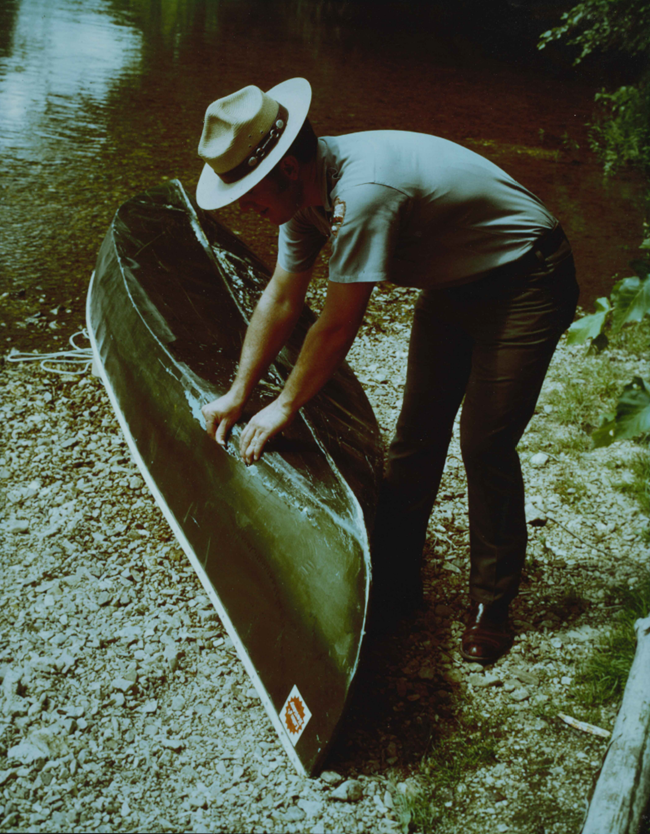
Photo courtesy of Darrel Blackwell
While teaching at Timber, Darrel became well acquainted with Jack Peters. Jack was the first ranger at Ozark National Scenic Riverways and had three children in the Timber school. Jack liked the way that Darrel conducted himself as a teacher and approached him about being a seasonal park ranger in the summertime when school was out.
“Jack was a really good guy,” Darrel stated. “When he lived at Pulltite, he was really good buddies with my dad. I remember one time he was over there helping my dad pull a calf even though he had a broken leg.”
Jack held his employees to a high standard. If someone asked what a certain plant or flower was, Jack considered it alright if you didn’t know it the first time a question was asked. However, you better learn the answer before it was asked again.
Darrel recalled, “One time he handed me a book and said ‘You learn these flowers.’ I’d always just considered them weeds my whole life. Jack expected things to be done a certain way as my boss. It wasn’t unreasonable, it was what needed to be done.”
Darrel enjoyed his time as a Ranger and reflected fondly on the experience.
“I remember that I really enjoyed it. It was a good job, and I looked forward to going to work every day. We did something different every day. We were either patrolling the river in a canoe, patrolling the river on horseback, or taking care of the campground; we never did the same thing two days in a row.”
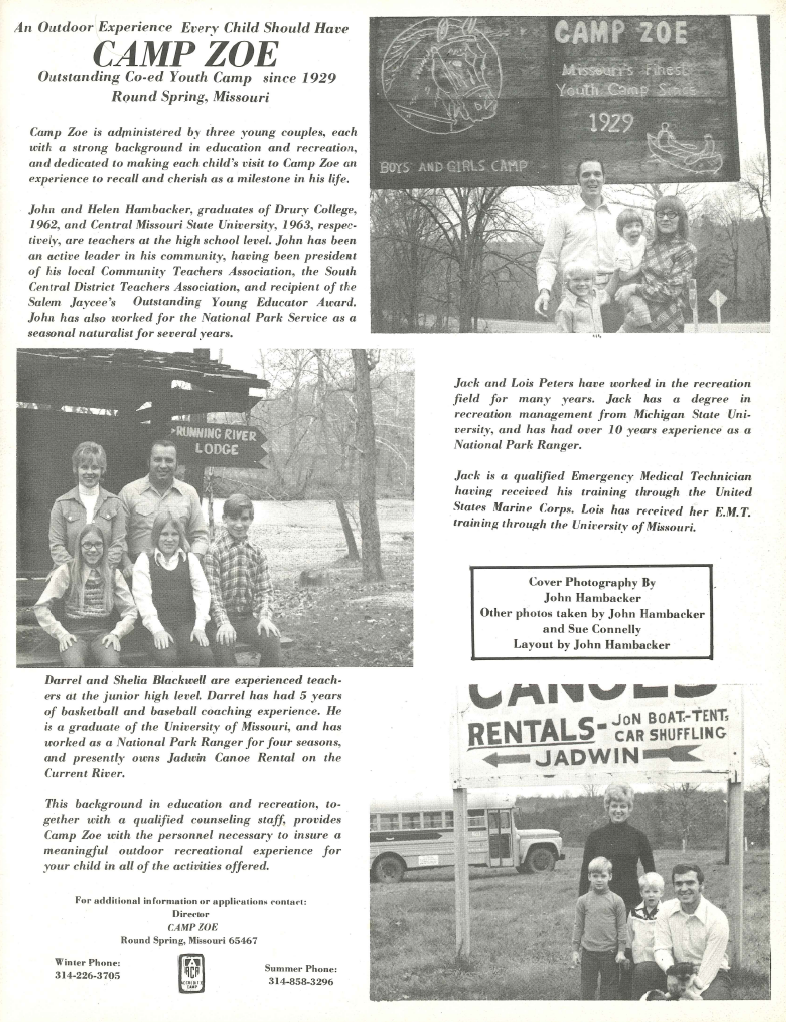
Image courtesy of Darrel Blackwell
He continued, “Public service, that was my job when I was a park ranger. It was safety, it was to give information, answer questions, and assist folks if they needed something. Secondary was the law enforcement. If we had to, we would do it. Jack Peters told us that we didn’t need to focus on catching people in the act. If we recognized that a group was likely to do something inappropriate you better make sure that you were visible with them, that you talk to them, and that you let them know you would be back in a little while to check in on them. Those groups knew I would be back around.”
Darrel frequently worked with the local football coach and former All-American from Southwest Missouri State, Bill Kaczmarek, as a ranger.
“If I had a problem, I would take him with me. Bill didn’t like to do much talking, so I would do all the talking. They wouldn’t look at me though, they would always be looking at him. Bill was quite the impressive fellow. He was drafted by the 49er’s but hurt his knee during spring training.”
One of Darrel’s highlights as a ranger was to be a part of the ceremony when the Ozark National Scenic Riverways was dedicated as a park in 1972 at Big Spring. Tricia Nixon, President Richard Nixon’s daughter, was present at the park for the dedication ceremony.
“When we went to the spring, I was the point to take her to the spring and knock the photographers out of the way. And I will always remember that because I had to knock one of the photographers out of the way because they were getting right into her face. When I did that, she ran into the back of me. I’ll always remember her and that event; she had platinum hair, she had a white dress, and she was so petite.”
While Darrel was working as a ranger, his dad was in a legal battle with the National Park Service over their family farm across from Pulltite.
“I was working for the park as a ranger from 1969 to 1972 while my dad was fighting [the National Park Service] in court at the same time. My dad didn’t have a problem with me working for them. When the government came to buy my dad’s place, they didn’t offer him anything for it. They told him they were going to use the power of eminent domain to condemn the property and they would have to go to court. He told them that was his right so he could get a fair price.”
Darrel’s family farm across from Pulltite, known as the “Blackwell Tract,” is one of the few farms that the NPS acquired through eminent domain in the Ozark National Scenic Riverways.
“It was 1970 whenever everything was finalized. Dad had hired Dorman Steelman, another Current River boy, but he couldn’t practice in federal court. So, they hired one of the Limbaughs down in Cape Girardeau to be the attorney to present the case in federal court. The government originally offered us $73,000 for the farm.”
During the trial where they were deciding the fate of the family farm, the judge had to get on to Darrel’s mother, Iceline Blackwell.
“Mom always had a purse with some candy in it,” he remembered. “During a recess from the proceedings, she was caught handing out candy to members of the jury members. The judge said, ‘Ma’am, you can’t do that,’ knowing that she meant no harm. After going to court, they paid $214,000 for right at 600 acres.”
Darrel had an eye for business and saw opportunity with a growing tourism industry coming to the area. In the fall of 1972, he entered a partnership with Jack Peters and John Hambacker to purchase Camp Zoe (site of present-day Echo Bluff State Park), a renowned youth camp focused on providing kids with a meaningful outdoor recreational experience. Shortly after this, in January 1973, Darrel purchased Jadwin Canoe Rental from Clinton and Sue Jadwin. In the 1970s Darrel split his time between both endeavors.
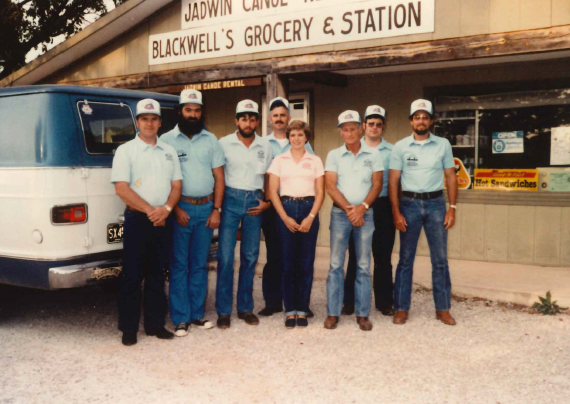
Photo courtesy of Darrel Blackwell
Darrel operated out of a farmhouse at the junction of Highway K and Highway ZZ when he was running Jadwin Canoe Rental in his first several years of business. In 1977, Darrel bought the building where Jadwin Canoe Rental currently operates from Charlie and Pat Liscombe, who previously used the building as a local grocery store. Darrel’s initial vehicles to transport floaters were Suburbans. However, necessity is the mother of improvisation in the Ozarks, and in the early days of operation it wasn’t uncommon to haul folks to the river in the back of a stock truck.
With a smile Darrel noted, “We didn’t do that too many times… I remember the first group we ever took [in the stock truck]; it was Tom and Linda. Their boy Todd still comes and floats with us. We took them up and put them in at Tan Vat on that first trip. It wasn’t too long ago that Linda came by here and we had a good laugh about that trip.”
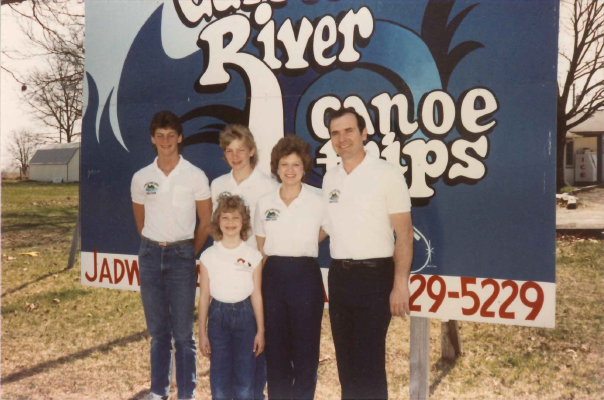
Photo courtesy of Darrel Blackwell
Darrel worked to improve the business and added to his fleet, recollecting “I bought my first bus off Danny Staples over at Alley Spring in 1975. It was a 1967 Chevy, 48 passenger bus.”
Darrel takes great pride in his family, his business, and the life it’s created. Listening to him, you can hear the joy he has in each story he tells. They bring a smile to his face and chuckle in his voice as he recounts them. For Darrel, his life has been about people: his family and the visitor.
“If you don’t provide a quality service for visitors the first time, they won’t ever come back. That’s the only difference between any of the outfitters; we all have canoes, kayaks, rafts, and tubes. The only thingthat separates one from another is how you treat your customers and how you take care of your customers,” Darrel observed. “For us, that comes natural. We like people; we like to talk; we like to make sure our people are taken care of. In the end, you have to treat people the way you want to be treated when you go somewhere.”
“I’ve enjoyed it. With the help of my wife working as a schoolteacher, we have made a decent living. [Jadwin Canoe Rental] has enabled me to do all of that. I haven’t done anything else since I sold my cattle and quit teaching in 1976. I haven’t done anything since 1977 other than the canoe rental. It’s not an 8-5 job. You have to be dedicated to it; you can’t halfway do it. I still enjoy it. I enjoy my customers, and I enjoy my employees. I’ve enjoyed everything that I’ve ever done. I enjoyed teaching school, and I really enjoyed the park service. I feel like I’ve always had a good relationship with the National Park Service. I’ve had a good life. I have a great wife, I have three wonderful kids, and I have three beautiful grandkids.”
* * *
Indeed, sometimes we are pretty lucky things happen the way they did. Ozark National Scenic Riverways is lucky to have had Darrel Blackwell as a partner for the past 50 years. Our commercial concessioners play an important role in helping share this great resource and area with visitors. Darrel has had the opportunity to have a positive impact on an untold number of people who enter the park. Whether you are here to experience your first float trip down the Current River, or your 100th, Darrel will be ready to greet you with a smile and show you true Ozark hospitality. His story will forever be connected to the ongoing story that is Ozark National Scenic Riverways.
As the telltale signs of spring have begun to emerge along the riverbanks, Darrel has started his 51st season operating Jadwin Canoe Rental. His spirit of service is evident in his children. His two sons, Brad and Scott, both continue to work with their dad at the canoe rental. His daughter, Amanda, continues in the family legacy of serving as a teacher and volleyball coach at a local school.
Thank you, Darrel, for your 50 years of service as a concessioner with the National Park Service and a lifetime commitment to the Riverways.
If you wish to float the Current or Jacks Fork rivers, you can contact Jadwin Canoe Rental or one of our other great concessioners through this link: Riverways Outfitters - Ozark National Scenic Riverways (U.S. National Park Service) (nps.gov) .
-NPS-
